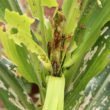The Zambia National Farmers Union (ZNFU) has called for closer collaboration with government in sensitizing farmers whose fields had been affected by the fall army worms to prevent further spread of the pests.
Fall army worms were first discovered in December last year in some parts of Lusaka Province and government had engaged strategic partners to purchase pesticides.
Last week, government distributed about 2,500 litres out of the total 4,166 litters of pesticides to affected farmers in Lusaka.
In an interview, ZNFU media and public relations manager Calvin Kaleyi said he was concerned about productivity seeing that the fall army worms were rapidly spreading, making them virtually impossible to eradicate.
“We know that parts of the Copperbelt, Southern Province and Lusaka have been affected. But you know these [army worms] are highly migratory pests, so obviously, they may even have migrated to nearby areas. They move about 100 kilometres in one night. But we started our education programmes for farmers even way before the planting season started, we were raising awareness on what to do when you discover that there is an area where fall army worms have been spotted and then bring experts to help you with spraying. You crush the eggs where you notice eggs for fall army worms. But we need more collaboration with the Ministry of Agriculture to see how we can work together to sensitize farmers and also to eradicate or indeed to control the spread,” Kaleyi said.
“These pests would be difficult to eradicate because they are highly migratory. So, we are just [searching] for ways in which [we can] control the spread so that we don’t [incur] as much losses as we did the previous seasons. So, that’s what we’ve been doing as ZNFU. But we just need more collaboration from the government because we already know where to find these farmers because we have presence in all the districts of this country. So, when our farmers are affected, it’s easy for us to identify them and go in there. So, we need close collaboration with government so that we can fight this battle together.”
He regretted that there was no pesticide that would completely eradicate the pests.
“It’s really difficult to [completely] eradicate army worms because they are highly migratory. 44 countries in Africa have reported army worms, and they keep spreading and spreading! They are very very difficult, extremely difficult to eradicate. You can control, but you cannot eradicate them. We know this is going to affect production, but we are hoping it doesn’t affect too much. Yes, farmers have been affected already, but we know that if we work closely together we can help to control the spread and we are hoping we don’t have a lot of such incidences where the pests go unreported because then we can have problems where farmers spot the fall army worms late. But we have been sensitizing them to say, once you spot a moth in your area then know that it’s fall army worms,” said Kaleyi.












